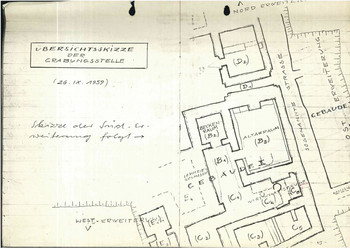Dissertationproject of Henrike Backhaus
Economic Structures and Processes in Early Bronze Age City-States. A Household-Centered Perspective
Residential areas form an integral part of early urban settlements in 3rd Millennium B.C. Upper Mesopotamia (Early Bronze Age – EBA) and have been excavated at a number of sites. Although the commoners living in these houses and households have been called "the real building blocks of society" (Stone 2007, 231), this field of research is still in its infancy: Archaeological research in the region has long focused on elites and only recently shifted its attention towards the analyses of households. It is evident, that the major part of EBA society consisted of commoners – people working the fields, producing, trading and consuming goods. Yet, small groups – "elites" – possessed the power to control major parts of the economic processes. This side of the coin has been studied ad nauseam. Within complex urban societies, such as EBA Mesopotamian city-states, a mixture between top-down and bottom-up factors is always to be expected and the current PhD wants to shed light on the latter – the commoners' perspective. The data used in the dissertation is largely unpublished field data from one of the largest contiguously excavated residential areas in Upper Mesopotamia: "Häuserviertel H" in the EBA site of Tell Chuera, Syria.
Stone 2007:
E. C. Stone: The Mesopotamian Urban Experience, in: E. C. Stone (ed.): Settlement and Society. Essays Dedicated to Robert McCormick Adams, Chicago 2007, 213-234.
Kurzbiographie
Henrike studierte Vorderasiatische Archäologie, Islamwissenschaft und Ägyptologie in Heidelberg. In Berlin absolvierte sie ein Master-Studium in Landschaftsarchäologie. Während des Studiums war sie an zahlreichen feldarchäologischen Projekten im In- und Ausland (Ägypten, Israel, Irak, Spanien, Syrien, Türkei) beteiligt, förderte den Nachwuchs im Rahmen eines Tutoriums und arbeitete in verschiedenen Positionen als studentische Hilfskraft. Seit April 2015 ist sie am Institut für Ur- und Frühgeschichte in Köln immatrikuliert, sowie Mitglied im Graduiertenkolleg 1878 der DFG „Archäologie vormoderner Wirtschaftsräume“ Köln/Bonn.
In ihrer Dissertation erforscht sie die alltäglichen wirtschaftlichen Prozesse in einem Wohnviertel einer städtischen Siedlung des dritten vorchristlichen Jahrtausends in Nord-Syrien. Um die Prozesse und Strukturen in diesen Haushalten, die uns nicht schriftlich überliefert sind, zu verstehen wendet sie ur- und frühgeschichtliche Methoden an.
Vorträge
„Defining a Site’s „Periphery“ by Means of Controlled Surface Collection”, gehalten im Workshop Periphere Wirtschaftszonen in Siedlungen – Graduiertenkolleg 1878 der DFG: Archäologie Vormoderner Wirtschaftsräume, Köln / Bonn, 07/2014.
Kontakt: henrikebackhaus(at)gmail.com

